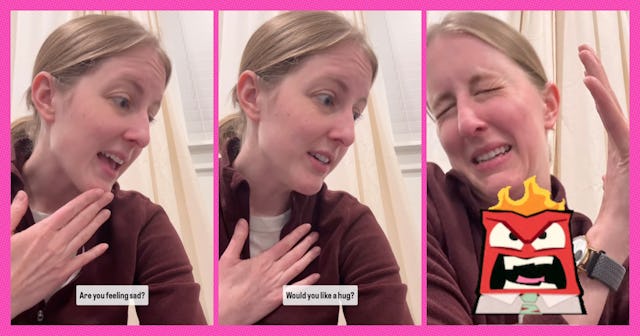These Popular Gentle Parenting Techniques May Not Work For Your Highly Sensitive Child
Here’s what you can do instead.

As far as modern parenting trends go, gentle parenting is a pretty solid one — after all, who doesn’t want to raise kind, compassionate kids with kind, compassionate parenting? While the premise is pretty great (and certainly a step up from... whatever was going on back in the day), gentle parenting isn’t an easy fix for every problem parents might face, and it doesn’t necessarily work for every kid, as mom Shelly Miller explained.
Miller, who goes by @theteachermomma on Instagram, explained that some popular gentle parenting tools, like the phrases “I can’t let you hit mommy. I’m going to hold your hands until you’re safe,” and “It’s OK to feel angry, but it is not OK to throw that toy stuff like this,” did the opposite of what they were intended to for her child — they would escalate her to a massive blowup.
“Yes, these tools can work great for some kids, and of course, they’re better than screaming and yelling and spanking our kids,” Miller said. “And they still were not what my child needed from me when she was flooded with emotion.”
Miller noted that these gentle parenting tips do work for two of her three children, but for her daughter, a highly sensitive child, they do nothing but put her more on edge.
So, how does she handle it? Miller says the key for her daughter is de-escalation.
“This usually looks like more personal space, not making eye contact, not talking to her or having a bunch of language going on, and then also me silently keeping her safe and other people safe without harping on her about it at the same exact time,” she explained. “It really was just a wholly different approach than what a lot of modern parenting advice is giving.”
If these tactics seem like they’re avoiding tackling the child’s feelings, well, that’s the point. Sometimes, even a simple phrase can upset an overstimulated child (or adult). For some kids, space to calm themselves down might be the best solution.
Many parents agreed with Miller and expressed their appreciation for shedding light on alternative parenting techniques.
“THANK YOU for being one of the only people that talks about sensitive kids. Another thing that doesn’t work great with mine is offering options, he just gets overwhelmed 😅,” one commented.
“Gentle parenting techniques work beautifully for my neurotypical child - but they are super escalating for my autistic child,” said another. “I’ve had to learn to adapt my parenting to fit each child’s needs and what works for one, doesn’t work for both.”
“This is spot on — i think the greatest pitfall of modern parenting strategies is how much nonstop talking and narrating they expect you to do with your kids when sometimes they just need some compassionate space and quiet,” another added.
However, some people took Miller’s video as a critique on gentle parenting, when they felt that de-escalation is actually already an important part of it.
“Gentle parenting is not constant narrative. Gentle parenting includes silence and space when required,” one mom wrote. “I have a sensitive child and my gentle parenting strategies included just non verbal communication, a presence and physical interaction.”
There’s not one set definition for gentle parenting, so de-escalation techniques like Miller’s may or may not be included depending on who you ask. Either way, Miller’s video touched on an important approach that’s often left out of conversations around parenting today: De-escalation is just one more tool to add to the parenting tool belt.